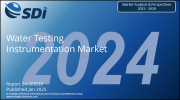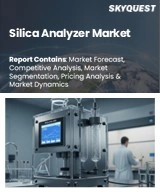
|
시장보고서
상품코드
1550804
수질검사 기기 시장(2024년)Water Testing Instrumentation Market 2024 |
||||||
사회는 전 세계 모든 지역에서 식수 및 기타 용도로 물을 이용하고 있습니다. 지표수, 지하수, 하천, 호수, 호수, 해양, 폐수, 기타 수자원을 포함한 수자원의 질과 이용 가능성은 전 세계에서 변화하고 있습니다. 인류의 산업과 경제의 역사, 세계 기후, 세계 수자원의 질과 분포는 밀접한 관계가 있습니다. 수질 검사 산업의 현재 동향은 산업, 농업, 유틸리티 규제에 대한 지역 경제의 우선순위를 따르는 경향이 있습니다. 수질 검사는 수질을 판단하기 위해 필요하지만 검사 시장의 용도와 기술 사양은 도시와 농촌, 고소득 지역과 저소득 지역에 따라 현저하게 다릅니다.
유엔의 지표에 따르면 세계 여러 지역에서 물 부족이 계속 증가하고 있습니다. 또한 지난 수년간 전 세계에서 물 관련 위기가 심화되고 있으며, 특히 물 인프라에 대한 투자가 역사적으로 뒤쳐진 국가와 극심한 기후 변화에 취약한 지역에서 더욱 두드러지게 나타나고 있습니다. 수질 요구사항은 법률, 용도, 최종 시장에 따라 크게 다른 규제의 적용을 받는 경우가 많습니다. 전 세계 수질 검사의 주요 용도에는 농업용 관개용수, 식수, 반도체 및 제약용 초순수, 산업 폐수 및 유틸리티 폐수 처리의 전, 중, 후처리를 포함한 물 재활용에서 오염물질 및 오염물질의 검출이 포함됩니다.
주요 세계 동향으로는 식수 PFAS 검사(및 규제 대상 PFAS 종의 범위 확대) 및 물의 미세 플라스틱 검사에 대한 세계 수요 증가가 있습니다. 이 분야는 현재 연구 초기 단계에 있으며, 수질 검사를 위한 보다 성숙한 기술과는 달리 자동화가 어려운 방법에 의존하고 있습니다.
이 보고서는 수질 검사 장비 시장을 조사했으며, 21개 기술 및 5개 기술 범주에 걸쳐 수질 검사에 사용되는 분석 장비 세계 시장을 평가했습니다. 각 기술 형태에는 연속적인 수질 모니터링에 사용되는 공정/온라인 기기부터 벤치탑형, 휴대용 등 실험실 및 현장에서 사용되는 기기까지 다양합니다. 이 보고서의 목적은 전 세계 산업 및 유틸리티의 물 분석 용도에 사용되는 분석 기술의 잠재력을 평가하고 예측하는 것입니다.
목차
서론
배경
기술 개요
- 전기화학의 개요
- 분자 분광법의 개요
- 원자 분광법의 개요
- 크로마토그래피와 질량분석의 개요
- 프로세스 애널라이저의 개요
시장의 수요
- 시장 전체
- 프로세스 애널라이저
- 크로마토그래피와 질량분석
- 분자 분광법
- 원자 분광법
- 전기화학
부록
KSA 25.02.18Society is reliant upon water for drinking and other applications in all regions of the world. The quality and availability of water resources, including surface water, ground water, streams, lakes, oceans, wastewater, and other water resources, varies globally. Human industrial and economic history, global climate, and the quality and distribution of global water resources are intimately connected. Current trends in the water testing industry tend to follow regional economic priorities related to industry, agriculture, and utility regulations. Water testing is necessary to determine water quality, but application and technology specifics of the testing market differ markedly between urban and rural, and between high- and low-income regions. According to UN metrics, water scarcity continues to increase in multiple regions of the world. There are also intensifying water-related crises globally over the last several years, especially in countries historically lagging in water infrastructure investments and in extreme-climate-prone regions. Water quality requirements are often subject to regulations that range dramatically based on legislation, applications, and end markets. Major uses of water testing globally include contaminant and pollutant detection in agricultural irrigation water, drinking water, ultrapure water for semiconductors or pharmaceuticals, and water recycling, including industrial and utility wastewater treatment before, during, and after treatments.
The "Water Testing Instrument 2024" report evaluates the global market for analytical instruments used to test water across 21 different techniques and 5 technology categories. The form-factor of these technologies within each technique includes process/on-line instruments used in continuous water monitoring to laboratory and in-field instruments such as benchtop and portable testing devices. The goal of this report is to assess and forecast the potential for analytical techniques used for water analysis applications in global industries and utilities.
Major trends include rising global demand for drinking water PFAS testing (and increasing scope of the PFAS species regulated) and for water microplastics testing, a young field whose current, early phase of ongoing research is reliant on difficult to automate methods, unlike more mature techniques for water testing.
Report Overview:
- A global landscape and trends of the current water industry by region and sector.
- Technology breakdown for all instruments and systems that are used for water testing and monitoring. Technology categories included in this report are:
- Electrochemistry
- Molecular Spectroscopy
- Atomic Spectroscopy
- Chromatography & Mass Spectrometry
- Process Analyzers
- Market demand segmented by technology, product type, region, sector, and application, along with market forecast for the next five years.
- Competitive landscape of vendors participating in each technology. Some of the top vendors in the overall market are presented below in alphabetical order:
- Agilent
- Analytik Jena (Endress+Hauser)
- DKK-TOA
- Emerson
- Endress+Hauser
- Hanna Instruments
- HORIBA
- Krohne
- Metrohm
- Mettler-Toledo
- Perkin Elmer
- SCIEX (Danaher)
- Sensorex (Halma)
- Shimazdu
- Thermo Fisher Scientific
- Veolia
- Veralto
- Waters
- Xylem
- Yokogawa
- Recent events and developments in the water testing industry
Table of Contents
Introduction
- About This Report
- Executive Summary
- Scope of Products
- Methodology
Background
- Regional Background
- Sector Background
Technology Overview
- Electrochemistry Overview
- Molecular Spectroscopy Overview
- Atomic Spectroscopy Overview
- Chromatography & Mass Spectrometry Overview
- Process Analyzers Overview
Market Demand
- Overall Market
- Process Analyzers
- Chromatography & Mass Spectrometry
- Molecular Spectroscopy
- Atomic Spectroscopy
- Electrochemistry
Appendix
- Recent Developments
- Recent & Upcoming Reports















